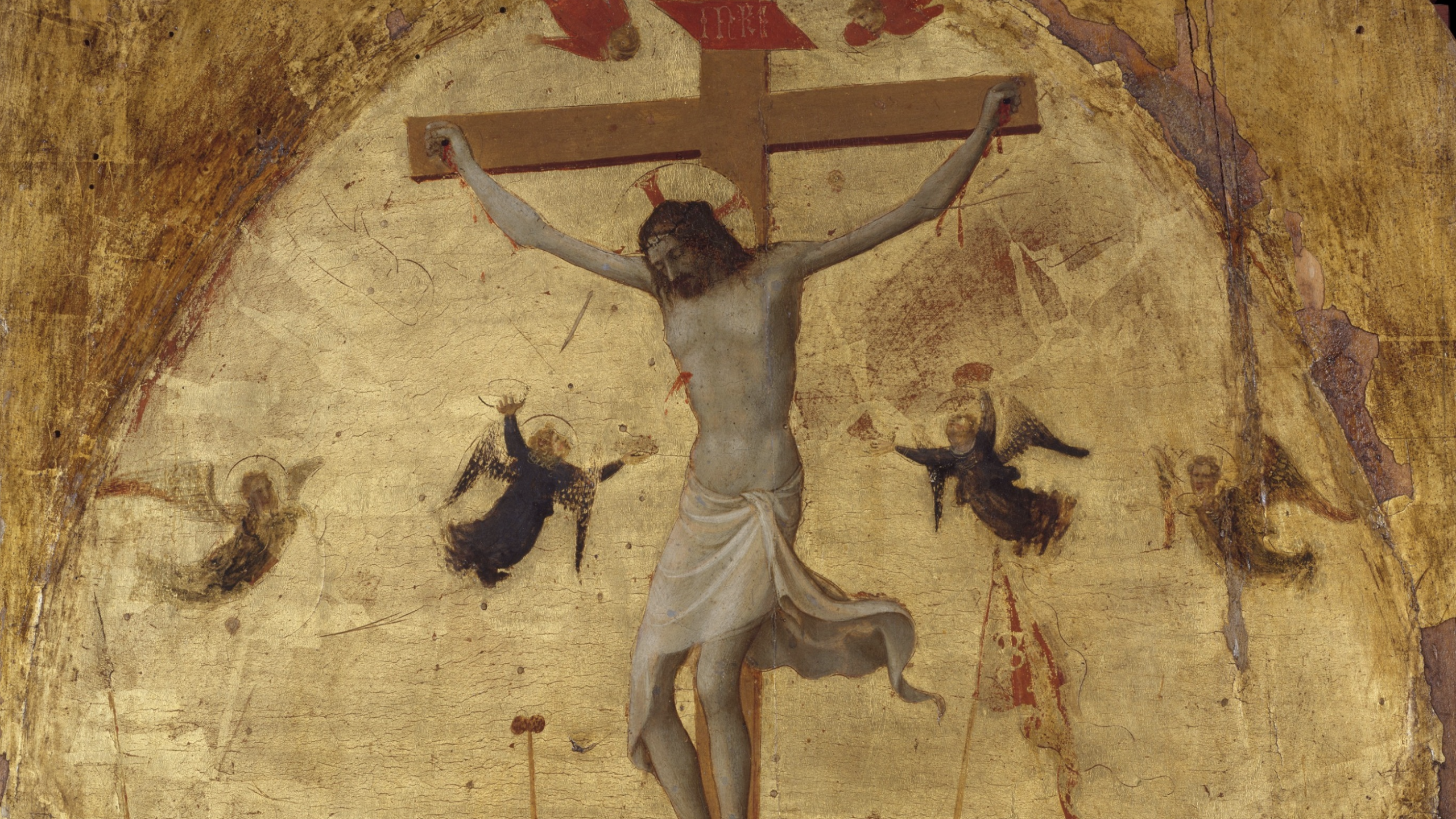On Good Friday, we contemplate the suffering and death of Jesus Christ, our Lord. Numerous Bible verses speak of Jesus’ death as redemptive: “Christ died for our sins in accordance with the scriptures” (1 Cor. 15:3); God “loved us and sent his Son to be the expiation of our sins” (1 John 4:10); Jesus came “to give his life as a ransom for many” (Matt. 20:28); and many more.
We accept the fact that Jesus’ death on the cross somehow effects our redemption. However, some of us struggle to understand precisely why that is the case. How does the death of God Incarnate redeem others? In this article, I will share some basic points drawn from St. Anselm and St. Thomas Aquinas to help us better comprehend this profound mystery.
A key term to understand in this context is ‘satisfaction’ (sometimes translated as ‘atonement’). In his work Cur Deus Homo (Why God Became Man), St. Anselm of Canterbury (d. 1109) used the term ‘satisfaction’ to help explain Christ’s saving work. St. Thomas Aquinas picked up that theme and expanded upon it.1
The basic idea is that sin is an offense against God. As a matter of justice, in order to make up for an offense, one must restore what was unjustly taken or denied to the person owed as well as offer something additional to make up for the offensiveness of the unjust act itself. As St. Anselm says, “When any one pays what he has unjustly taken away, he ought to give something which could not have been demanded of him, had he not stolen what belonged to another.”2 As St. Thomas Aquinas puts it: one makes satisfaction by offering “something which the offended one loves equally, or even more than he detested the offense.”3 In order to satisfy for human sins, something needs to be offered to God that was not owed and that God loves more than the sins offend him. It is also fitting that humanity itself supplies this satisfaction.
The way that Christ can be rewarded by the Father for his infinitely meritorious sacrifice is for his grace to be bestowed upon us.
But there’s a problem. Both aspects of making satisfaction are impossible for fallen humanity. Simply repenting and not offending again does not make up for the prior offense, because one already owes it to God to refrain from sin. By way of analogy, paying October’s rent does not make up for the fact that one did not pay September’s rent. Furthermore, we already owe everything to God, so there is nothing we could give him that we do not already owe him to make up for the offense given.
What’s the solution? Enter the Incarnation, Passion, and Death of Jesus Christ. As God and sinless man, Christ did not deserve to suffer or to die. As the second person of the Most Holy Trinity, his offering has infinite merit. By obediently and willingly offering his own suffering and death out of love for sinful humanity, Jesus offers to God something more pleasing to him than all of the sins of all of humanity were offensive to him. As Aquinas explains:
By suffering out of love and obedience, Christ gave more to God than was required to compensate for the offense of the whole human race. First of all, because of the exceeding charity from which He suffered; secondly, on account of the dignity of His life which He laid down in atonement, for it was the life of One who was God and man; thirdly, on account of the extent of the Passion, and the greatness of the grief endured. . . . And therefore, Christ’s Passion was not only a sufficient but a superabundant atonement for the sins of the human race.4
It is important to note that it is the charity with which Christ suffered—and not the suffering itself—that is pleasing to God. The fact that Christ was willing to suffer for us out of perfect charity is what God delights in, not the brutality of the death itself, which only manifests the depth of Christ’s love.5
How the Crucifixion of Christ redeems us is starting to come to light, but more can be said about precisely why and how we receive the benefits for that which only Christ gave. St. Anselm argues that due to the immensity of Christ’s charitable sacrifice, he is worthy of being rewarded. But to be rewarded, one must be given something one does not already possess. As divine, all things are already Christ’s. The way that Christ can be rewarded is by having the merits of his sacrifice offered to those whom he loves: us.6 As St. Anselm writes, “It would be both just and necessary that the gift should be given by the Father to whomsoever the Son wished; because the Son should be allowed to give away what is his own,” and “Upon whom would he more properly bestow the reward accruing from his death, than upon those for whose salvation, as right reason teaches, he became man?”7 For St. Anselm, the way that Christ can be rewarded by the Father for his infinitely meritorious sacrifice is for his grace to be bestowed upon us. As the Dominican theologian Jean-Hervé Nicolas phrases it, “All the gifts of grace given to men are the outpouring within them of the gifts—and, first of all, the primordial gift of the Spirit—given to Christ.”8

The Supplement to Aquinas’s Summa theologiae answers the question of whether one man can make satisfaction for another. There, it is argued that “charity avails more before God than before man. Now before man, one can pay another’s debt for love of him. Much more, therefore, can this be done before the judgment seat of God.”9
This salvation is more than juridical. There is a real metaphysical effect that results from this overflowing of Christ’s grace. As Rik van Nieuwenhove explains: “Through identification with Christ’s redemptive work and by sharing in his charity, we become utterly transformed and become part of him, and vice versa. The idea of incorporation into Christ—becoming part of the Body of Christ—is crucial to preclude a misunderstanding of Aquinas’s soteriology in transactional or even substitutional terms. . . . Because Christ and his Church form as it were one single mystical person . . . Christ’s satisfaction extends to all the faithful as to his members.”10 As Aquinas remarks, “Christ’s works are referred to Himself and to His members. . . . It is evident that whosoever suffers for justice’s sake, provided that he be in a state of grace, merits salvation thereby. . . . Consequently Christ by His Passion merited salvation, not only for Himself, but likewise for all His members.”
Here, we see a very simple introduction to one facet of Aquinas’s complex but profound notion of ‘the grace of headship’ (or ‘capital grace’) of Christ. Because all sanctifying grace comes from God through Christ to us, Christ is our head in the order of grace; we are the members of his Body, insofar as we receive the power of grace through him. The Church is the Mystical Body of Christ. Therefore, on this Good Friday, may we meditate upon Christ’s loving sacrifice, which made it possible for us to be united with him, with the whole Trinity, and with one another.
1 See Jean-Hervé Nicolas, Catholic Dogmatic Theology: A Synthesis, Book 2, On the Incarnation and Redemption, trans. Matthew K. Minerd (Washington, DC: The Catholic University of America Press, 2023), 351: “After St. Anselm, the notion [of satisfaction] became standard in theology of redemption. St. Thomas pushed the analysis of this notion of satisfaction much further.”
2 St. Anselm, Cur Deus Homo in St. Anselm: Basic Writings, trans. S.N. Deane, 2nd ed., 23rd printing (Chicago: Open Court Publishing Co., 2003), 216–217.
3 St. Thomas Aquinas, Summa Theologica [henceforth ST] 3.48.2.
4 Ibid.
5 For more on this, see Margaret M. Turek, Atonement: Soundings in Biblical, Trinitarian, and Spiritual Theology (San Francisco: Ignatius Press, 2022), especially 16.
6 St. Anselm, Cur Deus Homo, 297–298.
7 Ibid., 298.
8 Nicolas, Catholic Dogmatic Theology, Book 2, 293.
9 ST Supplement 13.2. In contrast with the largely Protestant notion of ‘penal substitution,’ Jean-Hervé Nicolas argues that St. Thomas’s soteriology is better characterized as ‘vicarious satisfaction.’ See Nicolas, Catholic Dogmatic Theology, Book 2, 346–348 and 350–351.
10 Rik van Nieuwenhove, “Bearing the Marks of Christ’s Passion,” in The Theology of Thomas Aquinas, eds. Rik van Nieuwenhove and Joseph Wawrykow (Notre Dame, IN: University of Notre Dame Press, 2005), 290.
